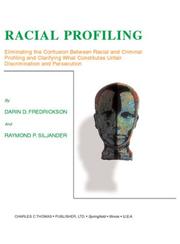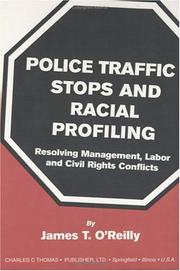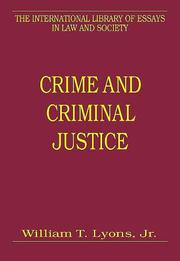| Listing 1 - 6 of 6 |
Sort by
|

ISBN: 0398083665 9780398083663 0398072558 9780398072551 0398072566 9780398072568 Year: 2002 Publisher: Springfield, Ill. Charles C Thomas
Abstract | Keywords | Export | Availability | Bookmark
 Loading...
Loading...Choose an application
- Reference Manager
- EndNote
- RefWorks (Direct export to RefWorks)
This book was written to eliminate confusion regarding what has come to be called racial profiling by clarifying the legitimate law enforcement practice of criminal profiling, and by clarifying what constitutes unfair discrimination, and persecution. This book was written to benefit sociology students, law enforcement officers, and anyone else in a position to be concerned with, or affected by, the profiling issue. Police administrators, judges, and legislators, must adequately understand the topics and their many ramifications if they are to make decisions that are based on fact rather than s

ISBN: 0398083819 9780398083816 0398072957 9780398072957 0398072965 9780398072964 Year: 2002 Publisher: Springfield, Ill. : Charles C. Thomas,
Abstract | Keywords | Export | Availability | Bookmark
 Loading...
Loading...Choose an application
- Reference Manager
- EndNote
- RefWorks (Direct export to RefWorks)
This textbook examines the controversial issue of racial profiling and how it affects a police officer's decision concerning which drivers should be stopped for questioning during routine traffic duty. This textbook takes the strong stance that racial profiling should be universally rejected as a police strategy. However, profiling of offenders without regard to race should continue to be used by police officers as a sound crime fighting strategy. The author explains that profiling is not only a necessary strategy for police officers, but that profiling is indeed a natural part of human psychology that allows people to better understand the world. The textbook is divided into eight sections. Section one explains the value of traffic stops to maintaining the public order and how some stops end up in court. Section two explains the controversy surrounding racial profiling and the ways in which it affects civil rights and even community relations. This section also takes a look at recent racial profiling litigation. Section three looks at specific State and Federal cases where racial profiling has presented legal complications. In particular, this section discusses racial profiling cases that occurred in New Jersey, Maryland, Illinois, Los Angeles, New York, Minnesota, and Ohio. The fourth section discusses legal issues involved with racial profiling, including an examination of the police civil rights pattern or practice statute, more commonly simply called section 14141. This section also provides an overview of common police defenses and case settlements. Section five explains the birth of Federal civil rights consent decrees and how they operate. This section also reports on the use of monitors to evaluate police department practices and on the fiscal impact of implementing racial profiling remedial actions. Section six reports on the effects of litigation on police conduct and operations. Section seven discusses the roles of elected officials, police managers, and police unions in relation to managing the impacts of legal remedies on police service. Finally, section eight outlines the consequences consent decrees have had on the operations of police departments. The author concludes by cautioning that although racial profiling should not be among the strategies employed by police officers, heavy-handed constraints placed on officers by political officials could seriously undermine the crime fighting potential of our Nations police departments.

ISBN: 0754625109 9780754625100 Year: 2006 Publisher: Aldershot Ashgate.
Abstract | Keywords | Export | Availability | Bookmark
 Loading...
Loading...Choose an application
- Reference Manager
- EndNote
- RefWorks (Direct export to RefWorks)
Law enforcement --- Racial profiling in law enforcement --- Imprisonment --- Criminal justice, Administration of --- Law enforcement - United States --- Racial profiling in law enforcement - United States --- Imprisonment - United States --- Criminal justice, Administration of - United States

ISBN: 0226316130 0226316149 9780226316130 9780226316147 9780226315997 0226315991 1281957070 9781281957078 9786611957070 6611957073 Year: 2007 Publisher: Chicago University of Chicago Press
Abstract | Keywords | Export | Availability | Bookmark
 Loading...
Loading...Choose an application
- Reference Manager
- EndNote
- RefWorks (Direct export to RefWorks)
From random security checks at airports to the use of risk assessment in sentencing, actuarial methods are being used more than ever to determine whom law enforcement officials target and punish. And with the exception of racial profiling on our highways and streets, most people favor these methods because they believe they're a more cost-effective way to fight crime. In 'Against Prediction', Bernard E. Harcourt challenges this growing reliance on actuarial methods. These prediction tools, he demonstrates, may in fact 'increase' the overall amount of crime in society, depending on the relative responsiveness of the profiled populations to heightened security. They may also aggravate the difficulties that minorities already have obtaining work, education, and a better quality of life& thus perpetuating the pattern of criminal behavior. Ultimately, Harcourt shows how the perceived success of actuarial methods has begun to distort our very conception of just punishment and to obscure alternate visions of social order. In place of the actuarial, he proposes instead a turn to randomization in punishment and policing. The presumption, Harcourt concludes, should be 'against prediction. '
Criminal behavior, Prediction of --- Law enforcement --- Racial profiling in law enforcement --- Statistical methods --- Statistical methods. --- Racial profiling in law enforcement - United States --- Criminal behavior, Prediction of - United States --- Law enforcement - United States - Statistical methods
Book
ISBN: 9780226113852 9780226113999 9780226114040 022611399X 022611404X 022611385X Year: 2014 Publisher: Chicago, Ill. The University of Chicago Press
Abstract | Keywords | Export | Availability | Bookmark
 Loading...
Loading...Choose an application
- Reference Manager
- EndNote
- RefWorks (Direct export to RefWorks)
In sheer numbers, no form of government control comes close to the police stop. Each year, twelve percent of drivers in the United States are stopped by the police, and the figure is almost double among racial minorities. Police stops are among the most recognizable and frequently criticized incidences of racial profiling, but, while numerous studies have shown that minorities are pulled over at higher rates, none have examined how police stops have come to be both encouraged and institutionalized. Pulled Over deftly traces the strange history of the investigatory police stop, from its discredited beginning as “aggressive patrolling” to its current status as accepted institutional practice. Drawing on the richest study of police stops to date, the authors show that who is stopped and how they are treated convey powerful messages about citizenship and racial disparity in the United States. For African Americans, for instance, the experience of investigatory stops erodes the perceived legitimacy of police stops and of the police generally, leading to decreased trust in the police and less willingness to solicit police assistance or to self-censor in terms of clothing or where they drive. This holds true even when police are courteous and respectful throughout the encounters and follow seemingly colorblind institutional protocols. With a growing push in recent years to use local police in immigration efforts, Hispanics stand poised to share African Americans’ long experience of investigative stops. In a country that celebrates democracy and racial equality, investigatory stops have a profound and deleterious effect on African American and other minority communities that merits serious reconsideration. Pulled Over offers practical recommendations on how reforms can protect the rights of citizens and still effectively combat crime.
Social problems --- Sociology of minorities --- Human rights --- Criminology. Victimology --- United States --- Racial profiling in law enforcement --- Traffic violations --- Police --- Complaints against --- Racial profiling in law enforcement - United States --- Traffic violations - United States --- Police - Complaints against - United States --- United States of America
Book
ISBN: 9781479892822 1479892823 9781479869978 Year: 2017 Publisher: New York NYU Press
Abstract | Keywords | Export | Availability | Bookmark
 Loading...
Loading...Choose an application
- Reference Manager
- EndNote
- RefWorks (Direct export to RefWorks)
Big data --- Criminal statistics --- Data mining in law enforcement --- Discrimination in law enforcement --- Electronic surveillance --- Law enforcement --- Police --- Racial profiling in law enforcement --- Data processing --- Law enforcement - United States - Data processing --- Police - United States - Data processing --- Big data - United States --- Data mining in law enforcement - United States --- Electronic surveillance - United States --- Criminal statistics - United States --- Discrimination in law enforcement - United States --- Racial profiling in law enforcement - United States
| Listing 1 - 6 of 6 |
Sort by
|

 Search
Search Feedback
Feedback About
About Help
Help News
News